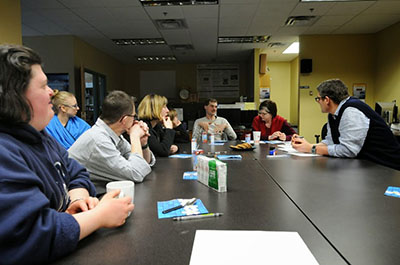INSTITUTES
Institute for Community Engaged Research (ICER)
ICER is an academic research centre that unites researchers from a broad range of disciplinary backgrounds, including anthropology, gender studies, indigenous studies, economics, education, health studies, human geography, nursing, social work, and sociology.
Sharing a commitment to research that supports diversity, equity, and social justice, the Institute facilitates the participation of community members, organizations,students, and academics as co-researchers. ICER is a hub for building relationships, collaboration, and effective knowledge creation and exchange.

Research Themes
Environment
Global and local political economy, human impact on the environment and the impact on societies of environmental change, commercial agriculture, animal rights, vegetarianism, ecofeminism and climate change
Surveillance and Cybersecurity
Internet access and broadband extension as issues of social justice, Indigenous communities and rural internet access, government regulation, surveillance and intrusion, citizens’ rights
Science and Technology
History and sociology of science, critical interpretations of the impact of technological change on societies, medicine and change, gender dynamics, transformation of the nature of work
Digital Humanities
Digital pedagogy, audio and video recording, photography, preservation and archiving, text encoding, data mining, interactive mapping
Migration
National and international policies, border and regime change, individual and structural push and pull factors, forced and voluntary migration, re-creation of cultures in new societies, hybrid cultures
Labour
Labour relations, social constructions of labour, gender and labour, government regulation, prison and other captive labour—both historical and current, labour rights and organization
Human Rights
Civil rights, state violence, land dispossession, prevalence and patterns of human rights violations, global and local political economy, global solidarity initiatives, gender mobilization, racism, socio-legal studies
Race and Ethnicity
Patterns of structural and historical racism—both national and international, racial and ethnic regulation, government bureaucracy, legal restrictions and remedies, cultural criminology, critical race studies
Religion
Intersections between religion, economics and definitions of personhood, religion and societal transformation, connections to gender, labour, race and global capitalism
Opportunities for Undergraduate Students
The Department of History & Sociology offers many opportunities for undergraduate students to gain valuable research experience. You can participate in research either as a volunteer research assistant, or through Directed Studies and/or Honours opportunities. Explore your options below.
The opportunity: Get experience helping faculty members, graduate students, or a mixture of the two, with their research projects. This is a non-paid, non-credit based opportunity that will give you the chance to participate in various elements of conducting research. The duties and length of the opportunity is determined by the supervising faculty member.
Prerequisites: Typically, no experience is required, but some opportunities may require the completion of certain courses prior to volunteering.
Consult your program advisor or a faculty member for more information.
The opportunity: Carry out your own research project under the supervision of a faculty member in history or sociology. You can earn three or six credits, depending upon the project.
Prerequisites:
- History: fourth-year standing, 6 credits of upper-level history courses, and permission of a faculty member to supervise the project. A minimum of 72% in all completed upper-level history courses is required.
- Sociology: permission of the department head and a faculty member to supervise the project.
Consult your program advisor or a faculty member for more information.
The opportunity: Research and write a research paper under the supervision of a faculty member. You will be involved in all aspects of the research process, and participate in colloquia and seminars.
Prerequisites: Third-year standing, a minimum of 12 credits of history coursework, an average of 76% in all attempted history courses, and a minimum overall average of 72%.
Consult your program advisor or a faculty member for more information.
Awards for Undergraduate Students
The Undergraduate Research Awards (URA) provide exceptional research experiences for students at UBC’s Okanagan campus.
The purpose of the awards is to encourage undergraduate students to pursue innovative and original research as part of their learning experience.
Our Partners and Donors
Together, we are making a difference, locally and around the world. Our partners and donors allow us to carry out our mission of helping the community, making advancements in research, and providing quality education in the field of history and sociology.
If you are interested in becoming a partner or donor, we would love to hear from you.




